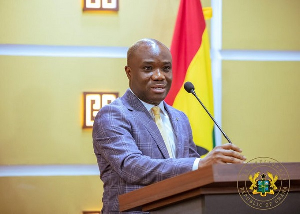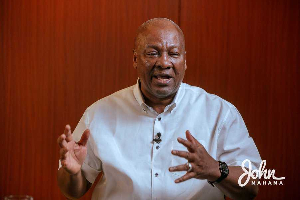Accra, Feb. 21, GNA - A number of respondents to an Institute of Economic Affairs (IEA) Constitution Review Survey, have called for the establishment of a mandatory long term National Development Planning (NDP) framework devoid of partisan politics.
About 91 per cent of the respondents agreed to the proposition for the establishment of an NDP framework, which must be entrenched and become mandatory for all governments, seven per cent were opposed it while two per cent were indifferent to it.
Mr Kwamina Ahwoi, Senior Lecturer at Ghana Institute of Management and Public Administration, who made this known at a press conference said about 94 per cent of the respondents agreed that the proposition of the NDP was practicable in the long-term and devoid of partisan politics.
The press conference was organised by the IEA for the release of a descriptive report on the 1992 Constitution Review Survey, 2010 entitled: "A survey on emerging issues from the community and regional consultations." The survey was conducted by a team headed by Mr Ahwoi, and Professor Mike Ocquaye, Second Deputy Speaker of Parliament and Member of Parliament for Dome-Kwabenya. Mr Ahwoi explained that in addition, 95 per cent of the respondents shared the view that the National Development Planning Commission must have a much clearer mandate that would incorporate industrial development in all the 10 regions.
On the extent of corruption and accountability under the Fourth Republic, the IEA survey revealed that as high as 83 per cent of the respondents were of the view that corruption was high. "The responses appeared largely homogenous by both sexes and age but there were some moderate regional variations in the perception of corruption," Mr Ahwoi flanked by Professor Ocquaye and Dr Kwadwo Tutu, a Senior IEA Economist stated.
The regional corruption perception index indicated that: 90.7 per cent of the respondents from the Eastern Region thought corruption was on the increase; followed by Upper West Region with 87.3 per cent, Northern Region 87.2 per cent and Greater Accra Region with 85.7 per cent. Others are Brong Ahafo Region; 82.2 per cent, Ashanti Region; 81.9 per cent, Western Region; 81.0 per cent, Central Region; 78.7 per cent, and Volta Region 77.6; per cent.
The gender statistics indicated that 83.3 per cent of men and 81.1 per cent of women held the view that corruption was high. On factors that contributed to the high incidence of corruption among public officials, about 27 per cent believed that excessive politicisation of issues of accountability was the main factor to blame. Another 27 per cent blamed it on poverty; 20 per cent on the absence o= f culture of moral probity, 15 per cent on mass illiteracy while ethnicity wa= s cited by only three per cent of the respondents as the main factor responsible for the high incidence of corruption among public officials. About four per cent of the respondents gave other reasons including society's crave for wealth and lavish expenditure, poor salaries for government officials, under resourcing and governmental control over State institutions established to check corruption, and a cultural acceptance tha= t "the palms of any person in authority should be greased and not be seen w= ith empty hands.
Up to 32 per cent of the respondents thought that the mandatory declaration of assets by public officials within stipulated time could not help reduce the high incidence of corruption among the personnel. Explaining the rationale for the survey, Dr Tutu said IEA decided to undertake it to complement the work of the Constitution Review Commission (CRC) to provide a unique perspective on some of the key issues being considered by the Commission.
It also sought to complement the vast body of information already obtained by the Commission through its own extensive consultation process. He said the overall purpose of the survey was to obtain public opinion on key issues that had dominated the debate on the constitutional review, which were drawn from a variety of areas and ranged from the relationship between the three arms of government, the manner in which the executive was formed, issues related to traditional authorities and matters concerning women and the physically challenged. The CRC was set up by the Government to review the 1992 Constitution t= o ensure that Ghana's constitutional framework is appropriate and robust to safeguard continued growth and respect for democracy and the rule of law.
General News of Monday, 21 February 2011
Source: GNA
















